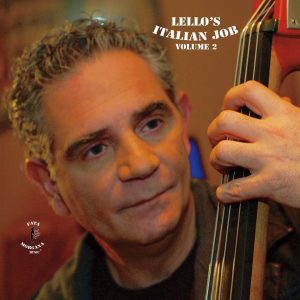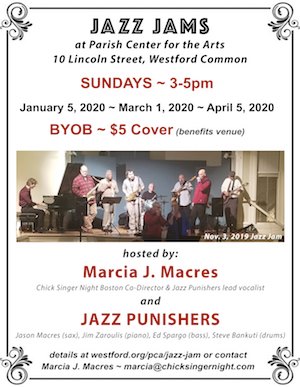 Lello’s Italian Job Volume 2 crackles with hot modern jazz through 12 exciting tracks. Led by electric bass and upright bass player Lello Molinari, this gang of jazz musicians perform with a careful balance of skill and art and often leave the listener wondering how they pull things off with such speed and precision. Originally from Naples, Italy, Berklee College of Music professor Molinari returns to his roots with jazz interpretations of the music of his old country in this follow up to his successful Volume 1 album.
Lello’s Italian Job Volume 2 crackles with hot modern jazz through 12 exciting tracks. Led by electric bass and upright bass player Lello Molinari, this gang of jazz musicians perform with a careful balance of skill and art and often leave the listener wondering how they pull things off with such speed and precision. Originally from Naples, Italy, Berklee College of Music professor Molinari returns to his roots with jazz interpretations of the music of his old country in this follow up to his successful Volume 1 album.
Opening track “O’Sarracino” breezes in pleasantly on the strength of Dino Govoni’s pretty, mellifluous, soprano sax. Molinari’s thick, knobby bass line beneath the melody pulsates with each note he squeezes out, giving this piece a perfect balance between the higher and lower registers. Speaking of high registers, electric guitarist Sal DiFusco chimes in with his own something to say and he says it with a fierce melodic line that simmers with talent and edge.
“Jazz Tarantella” finds Govoni switching to a more sultry tenor saxophone. Its raw emotion is something he presses out in sensitive tones, in considerate amounts, and in a perfect tenderness amidst his band mates. Molinari draws a serious amount of feeling out of his acoustic bass, his notes becoming their own special dance of notes around the beat. The beat is cleverly delivered by drummer Macello Pellitteri. Pelleitteri taps out a steady vibe on his drum kit which allows Govoni to send his spiraling notes up and around it. One cannot help but get caught up in all of the movements this band serve up in this spunky piece.
“Intermermezzo Sinfonico” eases its way into the listener’s consciousness on the strength of Govoni’s use of an Electronic Wind Instrument. His melodic fluidity is beauty personified as it rides over the plucky groove coming from the rhythm section.
“Sulla Strada Per Damasco” commences with Sal DiFusco’s sweet, assertive guitar line which is soon accompanied by Govoni’s freewheeling sultriness on tenor sax. It’s a real treat for the ears to hear what this sax man can do. He creates dramatic tension in the tune with lines that get thinner, flintier. Govoni’s sax work here recalls the cool bop music that jazz musicians were getting hip with in the 1950s and 1960s. A listener can easily picture a beat nick café in that era featuring bands that play this kind of music, music which whistled through the minds of the patrons. DiFusco eventually returns with a nervous, twitching but compelling electric guitar take on the melodic line. He gives this tune an edge simply by playing it so briskly on another instrument.
“Na Tazzulellla E Café” gets a funky flair from Sal DiFusco’s guitar synthesizer as well as a lilting, pretty sax melody from Dino Govoni. After their shiny interludes, DiFusco pays out nimble, brittle lines that move with a soft but engaging spirit. The soprano sax follows suit, skipping down the sidewalk whistling its jaunty melodic line.
“Tra Veglia E Sonno” finds Govoni playing a line on his tenor sax that seems to dance around the groove. His infectious leaps and bounds make for some intriguing intervals of notes. Coming with an assertive edge, electric guitarist DiFusco ignites the piece with a fiery take on the same spiral of notes that were so sweetly expressed by the horn. The guitar’s elegance is as serious as its simmering forward burn. Beneath the higher register, Molinari’s electric bass bops along with a line thick enough to balance all of the melody on. Drummer Marcello Pellitteri smacks out bulbous drum notes in an engaging pattern which is needed at this point to support some hypnotically zig zagging lines from the sax. Once again, the listener feels transported back to a beatnick café when jazz musicians kept this kind of intrigue and suspense within every measure.
Lello’s Italian Job allow guest musician Meena Murthy to take the lead with her violoncello on “I Pini De Roma.”. Her instrument offers a sound that feels deep though somewhat mournful. Eventually, the electric guitar takes a turn toward fusion jazz or maybe prog rock with its aggressive smolder. Numerous notes from electric bass and drums remain calmer than the guitar but fit it well with their speed. Just when the listener thinks this tune can’t get any more intriguing, it maintains tempo but changes timbres with a whistling Govoni clarinet line.
“Lidio Napoletano” combines a rumbling rhythm section with a polite amount of tenor sax. Brief sax intrusions into the stick work and bass touches creates a tension, a feeling that something is on its way. After perfecting that mood, something special happens. A contrast becomes a dialogue. Tight, quick notes from that tenor sax seem to be speaking the same language as Molinari’s acoustic bass. They play with the speed and urgency of excited gossips who finish each other’s sentences. The chemistry between them, as well as the urgent drum fills, injects this work with a special medicine, one that keeps this intriguing, even when the instruments suddenly temper their energy.
Old world acoustic guitar styles and acoustic bass compliment each other nicely on “Anema E Core.” The DiFusco strum techniques here range from the Mediterranean style of combining melody and rhythm in one melodic line. Subtle picking of acoustic guitar notes shade in the melody well, setting a reflective, somber mood. Molinari’s smooth run of low end notes color the piece in a darker hue while serving as an important backbone for all of those special guitar notes above. It’s intriguing how well Molinari supports a higher register while also remaining its equal partner.
“Torna A Surriento” is lead by the pied piper effect of guest Meena Murthy, once again, on Violoncello. Her line is a lush hum of tenderness. It sets a cool, relaxed mood with its unique sound, letting the other instruments play a gentle line around her. The drums mesh with her line by subduing its rush of fills. Like other pieces on this album, things change quickly. A snappy sax line tap dances around a moveable groove, finessing the melody line with easeful switching from meter to meter. This old Italian song will likely sound familiar. Elvis Presley recorded an arrangement of it called “Surrender.”
“Tu Si Na Cosa Grande” ushers us in with Govoni’s sweet, tender flute melody which runs prettily alongside Meena Murthy’s Violoncello. The feelings conjured by the two include longing, a sense that one cannot be somewhere that they’d like to be. DiFusco augments this awareness with subtle movements of brittle guitar notes, moving around his fretboard with uncanny aplomb.
Closing track “Neapolitan Snake” is aptly titled. One can feel a snake presence in the way Molinari’s electric bass, enhanced with effects, quivers around Marcello Pellitteri’s well placed drum fills. Juicily filled with the bass sound, it finishes up the album with a fine touch.
Lello’s Italian Job present a lot of fine selections on Volume 2, and they play them with their own special verve. Each track is engaging and involving and a good listener will return to them again and again to hear more of how much talent this band puts into each number.

